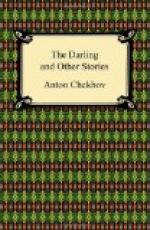Laptev gave her a hundred roubles, and promised to talk to Panaurov, and saw her out to the hall in trepidation the whole time, for fear she should break into sobs or fall on her knees.
After her, Kish made his appearance. Then Kostya came in with his photographic apparatus. Of late he had been attracted by photography and took photographs of every one in the house several times a day. This new pursuit caused him many disappointments, and he had actually grown thinner.
Before evening tea Fyodor arrived. Sitting in a corner in the study, he opened a book and stared for a long time at a page, obviously not reading. Then he spent a long time drinking tea; his face turned red. In his presence Laptev felt a load on his heart; even his silence was irksome to him.
“Russia may be congratulated on the appearance of a new author,” said Fyodor. “Joking apart, though, brother, I have turned out a little article—the firstfruits of my pen, so to say—and I’ve brought it to show you. Read it, dear boy, and tell me your opinion —but sincerely.”
He took a manuscript out of his pocket and gave it to his brother. The article was called “The Russian Soul”; it was written tediously, in the colourless style in which people with no talent, but full of secret vanity, usually write. The leading idea of it was that the intellectual man has the right to disbelieve in the supernatural, but it is his duty to conceal his lack of faith, that he may not be a stumbling-block and shake the faith of others. Without faith there is no idealism, and idealism is destined to save Europe and guide humanity into the true path.
“But you don’t say what Europe has to be saved from,” said Laptev.
“That’s intelligible of itself.”
“Nothing is intelligible,” said Laptev, and he walked about the room in agitation. “It’s not intelligible to me why you wrote it. But that’s your business.”
“I want to publish it in pamphlet form.”
“That’s your affair.”
They were silent for a minute. Fyodor sighed and said:
“It’s an immense regret to me, dear brother, that we think differently. Oh, Alyosha, Alyosha, my darling brother! You and I are true Russians, true believers, men of broad nature; all of these German and Jewish crochets are not for us. You and I are not wretched upstarts, you know, but representatives of a distinguished merchant family.”
“What do you mean by a distinguished family?” said Laptev, restraining his irritation. “A distinguished family! The landowners beat our grandfather and every low little government clerk punched him in the face. Our grandfather thrashed our father, and our father thrashed us. What has your distinguished family done for us? What sort of nerves, what sort of blood, have we inherited? For nearly three years you’ve been arguing like an ignorant deacon, and talking all sorts of nonsense, and now you’ve written—this slavish




